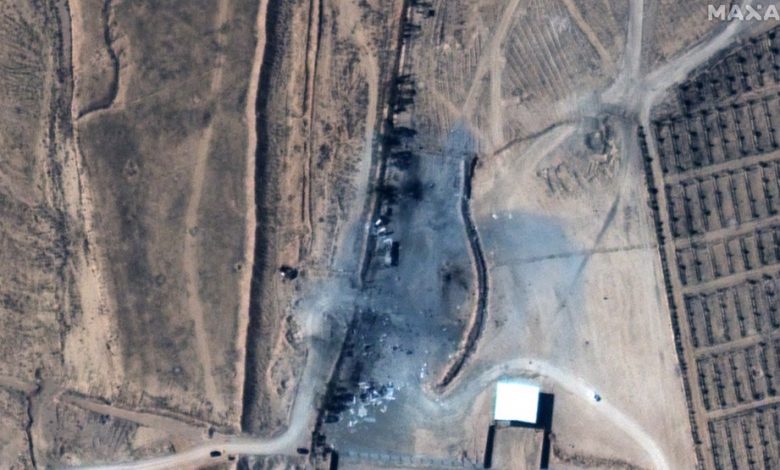Iraqi resistance groups: US to pay heavy price for airstrikes
Iraqi resistance groups have condemned a recent US aerial assault against positions held by anti-terror Popular Mobilization Units (PMU) on the Syrian border, saying the attack will prove to be very costly for Washington.

In a joint statement released on Saturday, the groups said the bombing of PMU observation posts will destroy the understanding and rules of engagement that have already been reached among various sides.
“Such actions by the United States will not be the last and will be repeated, but they will definitely prove the most costly for the Americans,” the statement said.
The groups also asked the Iraqi government to clarify its stance on the attack and other acts of the occupying forces.
They called on the government to provide a “full, transparent and sufficient explanation” about US claims that Iraqi officials had provided intelligence collaboration in the attack on PMU which is widely known as Hashd al-Sha’abi.
Moreover, the groups underlined the need for “a proper response to the US crime”, warning that any laxity in this regard would bring about dire consequences.
In their statement, the Iraqi resistance groups took aim at the “traitors making absurd excuses to legitimize the presence of criminal American occupying forces on Iraqi soil, something that runs counter to the law and the constitution”.
“They are also slandering the opponents of the US presence and those confronting the occupiers,” the groups said, reminding of the January 2020 parliamentary resolution that demands the withdrawal of all foreign military from Iraq.
Friday’s US airstrikes against Iraq’s popular anti-terror forces have sparked a flurry of outrage and drawn condemnation even from American politicians, with many of them saying such attacks would encourage terrorism in the region.
Washington said the strikes on the positions of the Kata’ib Hezbollah group along the Iraq border were in response to rocket attacks against US targets in Iraq, but the force has denied any role in the attacks.
Last week, numerous reports emerged about unusual movements by US troops near the border between Iraq and Syria.https://if-cdn.com/Xd0MGmP?v=1&app=1
US troops are based across the border in al-Tanf in Syria, where militants fighting the Syrian government are reportedly trained and armed and used for operations in Iraq and elsewhere.
Over the years, there have been numerous reports about the infiltration of Daesh elements from Syria into Iraq under the protection and logistical assistance of US troops.
Hashd al-Sha’abi and its affiliates, which have been integrated into Iraq’s regular forces, are deployed on the Syrian border and helping the army stem the movement of terrorists between the two countries.
Attacks supposedly against US targets but often with little impact have escalated over the past year, especially since the Iraqi parliament passed the law that mandates a full withdrawal of all foreign troops from the country.
On Saturday, Iran’s Foreign Minister Mohammad Javad Zarif told his visiting Iraqi counterpart Fuad Hussein in Tehran that the attacks as well as the recent events in Iraq were suspicious.
“We insist that the Iraqi government identify those behind these incidents,” said the top Iranian diplomat.
Experts say the rise in terrorist activities is apparently aimed at creating a sense of insecurity in Iraq and providing a pretext for the US to keep its troops in the country.
Syria’s official news agency SANA on Thursday reported that US military forces planned to transport a new batch of imprisoned Daesh terrorists from the northeastern Syrian province of Hasakah to al-Tanf.
“We emphasize that the withdrawal of US troops from Iraq is the only way to achieve stability in the country,” Qais Khazali, leader of Iraq’s Asa’ib Ahl al-Haq movement, said Friday.
Hadi al-Amiri, head of Fatah (Conquest) Alliance at the Iraqi parliament, has called on Prime Minister Mustafa al-Kadhimi to launch an investigation into the US strikes as well as the alleged intelligence cooperation between the Iraqi government and the Pentagon.
“Our intelligence indicates that, contrary to Washington’s claims, Hashd al-Sha’abi and not the Iraqi Islamic Resistance in Syria was the target of the attack,” al-Amiri said Friday.
In a statement carried by al-Sumaria television network, Iraq’s Defense Ministry expressed surprise at the US claims about intelligence cooperation with Baghdad prior to Friday’s strike.
It said that Iraq’s ties with the US-led coalition forces are restricted to the fight against the Daesh terrorist group while preserving the country’s independence and sovereignty.
The Iraqi Interior Ministry said the cooperation with the coalition is only focused on boosting the capabilities of Iraqi security forces in policing works.







